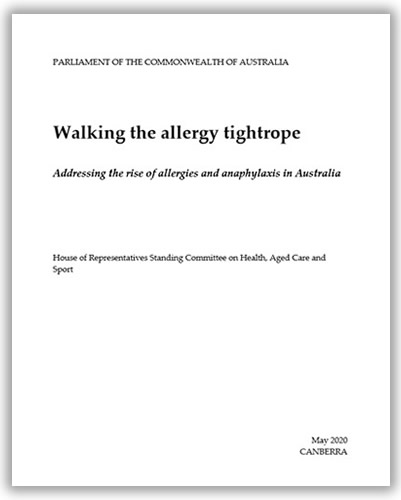National Allergy Strategy welcomes report from parliamentary inquiry into allergies and anaphylaxis
15 June 2020:

The National Allergy Strategy welcomes the Walking the allergy tightrope report tabled today by Trent Zimmerman, chair of the committee which conducted a parliamentary inquiry into allergies and anaphylaxis. The National Allergy Strategy also acknowledges the support provided by the Hon Greg Hunt, Minister for Health in progressing the inquiry.
![]() Walking the allergy tightrope - Addressing the rise of allergies and anaphylaxis in Australia1.15 MB
Walking the allergy tightrope - Addressing the rise of allergies and anaphylaxis in Australia1.15 MB
“We would like to thank the parliamentary inquiry committee for what has been a very thorough and considered inquiry into the impact of allergic diseases,” said Dr Preeti Joshi, Co-chair of the National Allergy Strategy. “It was clear from the way the hearings were conducted that this Committee wanted to identify and understand all the important issues,” Dr Joshi said.
The National Allergy Strategy specifically welcomes recommendations regarding the establishment of an anaphylaxis register, additional allergy research, consideration of a healthcare card for allergic consumers, national standardisation of emergency department discharge after anaphylaxis admissions, minimum standards for allergy training for health professionals, improved training for food service, improved access to food and drug challenges, and improvement and expediating of food labelling.
It is also encouraging that the Committee recognises the importance of the National Allergy Strategy, Allergy & Anaphylaxis Australia (A&AA) and Australasian Society of Clinical Immunology and Allergy (ASCIA), as key organisations providing expertise and support to the community. We hope that ongoing sufficient funding will continue to support the important work each organisation undertakes.
“The National Allergy Strategy, is a partnership between the Australasian Society of Clinical Immunology and Allergy (ASCIA) and Allergy & Anaphylaxis Australia, the peak medical and patient support organisations for Australia and this is a key strength of the Strategy,” Ms Said, Co-chair of the National Allergy Strategy stated. “We are able to put consumers at the centre of everything we do with the support of the peak medical body and other key stakeholder organisations,” she said.
In 2015, the National Allergy Strategy was launched with the support of key stakeholder organisations who worked together to develop a blueprint for what needed improving and how it could be achieved. The recommendations tabled today address many of the key issues that the National Allergy Strategy believes are important to improving the management of allergic diseases in Australia.
Over the past 5 years, the National Allergy Strategy has engaged with key stakeholders to get an understanding of how to improve drug allergy management and what a shared care model for allergy should entail. With regards to the recommendations related to these issues, it is important that the National Allergy Strategy provides leadership in implementing these recommendations. In addition, the National Allergy Strategy has been engaging with the food service sector including hospital food service to ensure nationally standardised training is available free of charge.
The National Allergy Strategy are very thankful for the funding received by the Australian government over the past few years as well as input from key stakeholder groups. This has enabled us to agree on priorities and make significant progress in important areas requiring national attention to support teens and young adults living with severe allergy (250K youth project), the food service sector (All about Allergens training), parents through allergy prevention (Nip allergies in the Bub project) and work through the issues regarding drug allergy management and a shared care model for allergy through scoping projects and more recently the development of minimum standards for anaphylaxis prevention and management in schools and early childhood education and care.
“While there have been many achievements over a short period of time, there are still many more gaps in care that need to be addressed,” Dr Joshi said. “We look forward to continuing to work with the Australian government to assist with implementation of the committee’s recommendations,” she stated.
The parliamentary inquiry into allergies and anaphylaxis report is available to view from the weblink below or click on the PDF below.
Contact
Sandra Vale
National Allergy Strategy Manager

